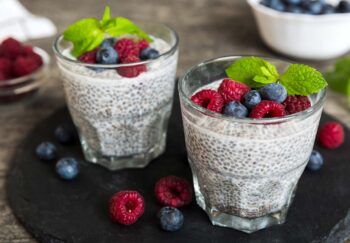Coronary artery disease (CAD) can sneak up on you. Over time, sticky plaque buildup in the blood vessels in your heart (called atherosclerosis) lowers how much oxygen your heart gets. If ignored, over time it can lead to an emergency.
The good news? Eating the right foods can help keep your heart and arteries healthy. By making the right diet choices, you can slow down that process and prevent heart disease.
“Diet plays a huge role in lowering your risk for developing coronary artery disease,” says Katherine Basbaum, MS, RD, a clinical dietitian at UVA Health. “Incorporating cardioprotective foods, like fruits, vegetables, and whole grains, into your diet can actively lower your risk of developing coronary artery disease."
How Does Food Help with CAD?
While things like age or family history can increase your risk for plaque buildup leading to CAD, what you eat is also a factor. Too much of certain things in food can raise your cholesterol and blood pressure, and cause plaque to build up in your heart quicker.
But, healthy foods can:
- Lower bad cholesterol
- Reduce inflammation
- Keep your blood pressure steady
These all help protect your heart.
What Foods Should You Avoid in a Heart Healthy Diet?
Foods that have too much salt, sugar, or saturated fats aren’t good choices for a heart healthy diet.
Foods High in Saturated Fats
While unsaturated fats can be extremely beneficial for heart health, too much saturated fat raises your cholesterol and increases your risk of CAD. Examples of foods with lots of saturated fat can include:
- Fatty cuts of meat
- Full-fat dairy (like whole milk and cheese)
- Sausages and hot dogs
- Fried foods
Wondering If You're Doing Enough to Support Your Heart Health?
A UVA Health heart disease expert can help.
"It’s very well established that if you have increased levels of bad cholesterol (or LDL cholesterol), it puts you at a higher risk of having a cardiac event because the LDL cholesterol contributes to plaque build-up in the arteries," says Basbaum.
Processed Foods
“Processed” just means the food has been changed from its raw, original form. That includes things like cooking, combining with other food, drying, adding preservatives, canning, and more. Processed food isn’t necessarily bad for you. In fact, most of what we eat is processed in some way.
But foods like chips, cookies, snacks, and others often have unhealthy fats, added sugar, and lots of salt to help keep them shelf-stable. These foods can cause weight gain, raise your LDL cholesterol, and affect blood sugar control, all of which are bad for your heart.
“Processed foods are major sources of hidden sodium that contribute to hypertension and heart disease,” Basbaum says. “Whenever possible, try to consume minimally processed foods to retain nutrition and avoid added sugars, saturated fats, extra salt, and other unhealthy additives."
Sugary Foods and Drinks
Too much sugar, especially from sugary drinks like soda, juices, and sweetened teas, can cause inflammation. That can speed up plaque buildup in your blood vessels. Eating too much sugar can also lead to weight gain.
Basbaum notes, “Added sugars, especially those in sugar-sweetened beverages, are a major contributor to weight gain and can increase the risk of developing heart disease.”
What Are Good Foods for Heart Health?
Eating the right foods makes a big difference. When at the grocery store or a restaurant, think about your choices. At the grocery store, choose mostly whole, fresh foods, and be sure to check labels for added sugar, saturated fat, and sodium levels when buying packaged food, are good rules of thumb.
Low-Fat Proteins
Your body needs protein to build muscles and stay strong, but some proteins are better for your heart. Great options include:
- Fish, especially salmon or tuna, which have heart-healthy omega-3 fats
- Beans and lentils, which are full of fiber and plant-based protein
- Chicken or turkey breast without the skin
- Low-fat or fat-free dairy like yogurt or milk
- Avoid fatty and processed meats like bacon, sausage, and fried chicken
Fruits and Vegetables
Fruits and veggies are packed with vitamins, minerals, and fiber. Fiber is great because it can help lower your cholesterol. Aim to fill half your plate with non-starchy vegetables like leafy greens, carrots, and bell peppers.
Eating a variety of colorful vegetables and fruits is a fun way to get more nutrients. Fresh or frozen vegetables are best, but if you buy canned veggies, choose ones with no added salt.
Whole Grains
Whole grains like brown rice, whole wheat pasta, and oatmeal are full of fiber, which helps control blood sugar and keep you full. They’re much healthier than white bread, white rice, and other processed grains. Whole grains also help lower blood pressure, which is important for heart health.
Healthy Fats
Not all fats are bad for you. But the source of it and how much you have matters. Focus on healthy fats like:
- Olive oil
- Avocados
- Nuts and seeds
- Fatty fish (like salmon)
These fats can lower bad cholesterol (LDL) levels and protect your arteries. Just be careful not to eat too much fat, as it’s still high in calories. "When choosing animal protein, opt for leaner cuts like 92-96% lean ground beef, turkey breast, or pork tenderloin. These have considerably less saturated fat compared to fattier options,” recommends Basbaum.
Avoid saturated fats, found in butter, margarine, and fried foods, as these can raise your bad cholesterol.
Low Sodium Foods
Too much salt can raise your blood pressure. High blood pressure makes your heart work harder and can cause damage over time.
To help prevent this, eat less processed food, such as canned soups, frozen dinners, and packaged snacks, because they tend to have a lot of salt. Instead, try cooking meals at home using fresh or frozen foods and adding a little salt yourself.
Basbaum notes, “It's not the salt you add at home to fresh or minimally processed ingredients that's the problem; it's the sodium in packaged foods used to enhance flavor and prolong shelf life."
Treat Your CAD, Prevent a Heart Attack
CAD progresses slowly and can surprise you. You might not have any symptoms until it becomes serious. Having the right diagnosis and treatment plan is essential to prevent an emergency. Discover how we can help you in managing your heart health journey.
Are There Good Diets for Heart Health?
You don’t need to follow a specific diet plan to maintain and improve heart health. But, 2 specific diets stand out: the Mediterranean diet and the DASH diet (Dietary Approaches to Stop Hypertension). Both focus on foods that are good for your heart.
Mediterranean Diet
This diet is all about whole grains, fruits, vegetables, chicken, fish, beans, and healthy fats like olive oil, avocados, nuts, and seeds. These foods have fiber, vitamins, and other things that help your heart stay strong. You can also enjoy treats like a little red meat or sweets sometimes, which makes this diet easy to stick to.
DASH Diet
The DASH diet was made to help people lower their blood pressure. It’s a lot like the Mediterranean diet but with a greater focus on eating less salt. Research shows this diet can lower blood pressure, reduce bad cholesterol, and increase good cholesterol, which helps protect your heart.
Tips for Grocery Shopping
Shopping smart makes it easier to keep a heart healthy diet. Follow these tips:
- Stick to the edges: Fresh fruits, veggies, dairy, and lean meats are usually around the store’s edges.
- Read Labels: Check for hidden sugar, salt, or unhealthy fats in packaged foods.
- Go Whole Grain: Choose breads and cereals that say “100% whole grain.”
- Plan Ahead: Write a shopping list to lower the chance of impulse buying unhealthy snacks.
Make Healthy Eating a Habit
Protecting your heart is about building habits that last. Start with these steps to better eat for a healthy heart:
- Make small changes. Swap white bread for whole grain or use olive oil instead of butter.
- Add flavor naturally. Use spices, lemon juice, or herbs instead of salt or heavy sauces.
- Cook at home. You’ll know exactly what’s in your food.
- Be flexible. It’s okay to have a treat sometimes — just make sure most of your meals are healthy.
"The idea is, have the majority of your diet composed of these heart-healthy, proven beneficial foods—like fruits, vegetables, whole grains, and plant-based fats and proteins," says Basbaum. “The key isn’t about completely eliminating red meat or processed foods, but being savvy — choosing leaner cuts, lower sodium options, and consuming them very moderately.”


